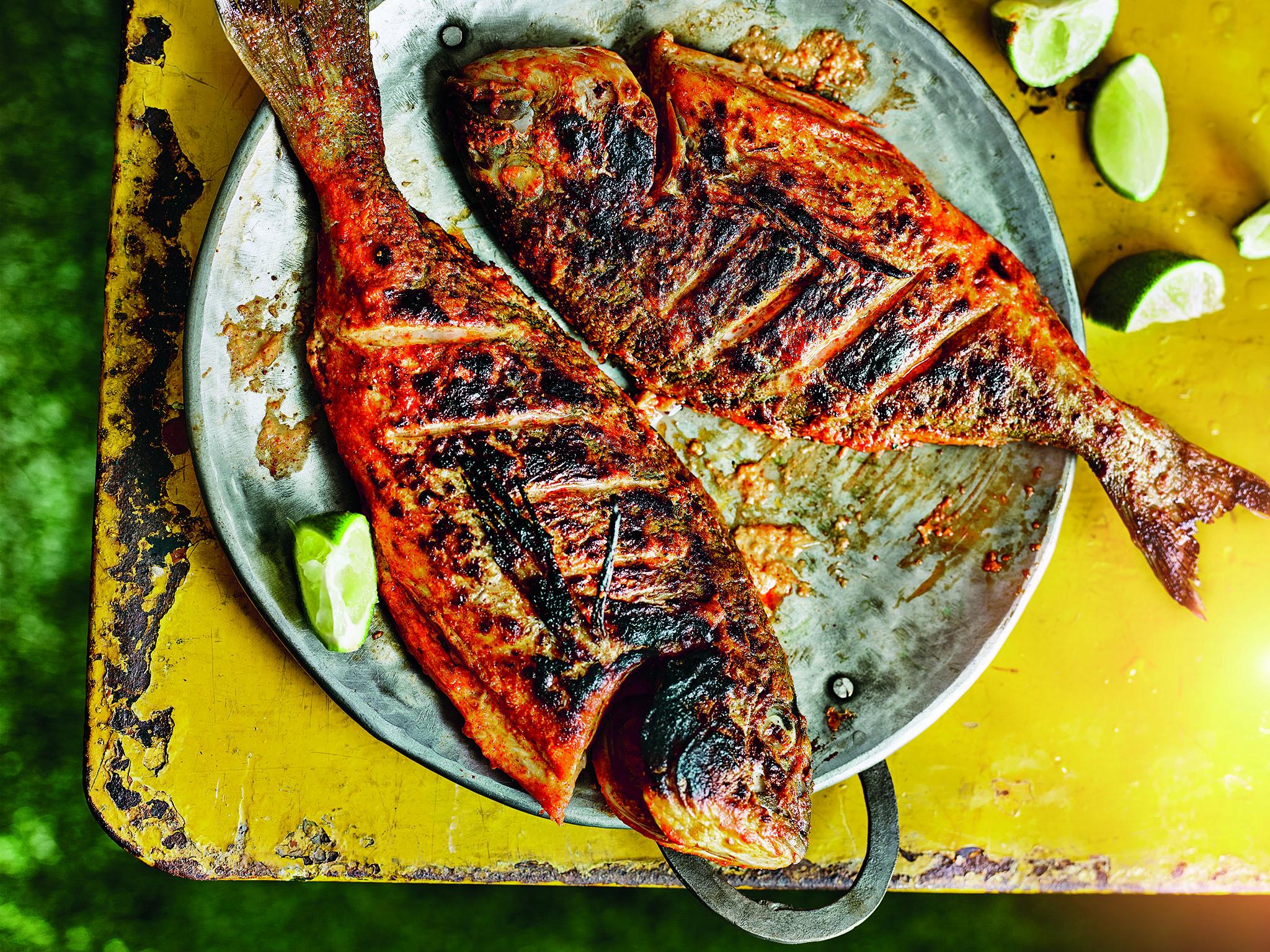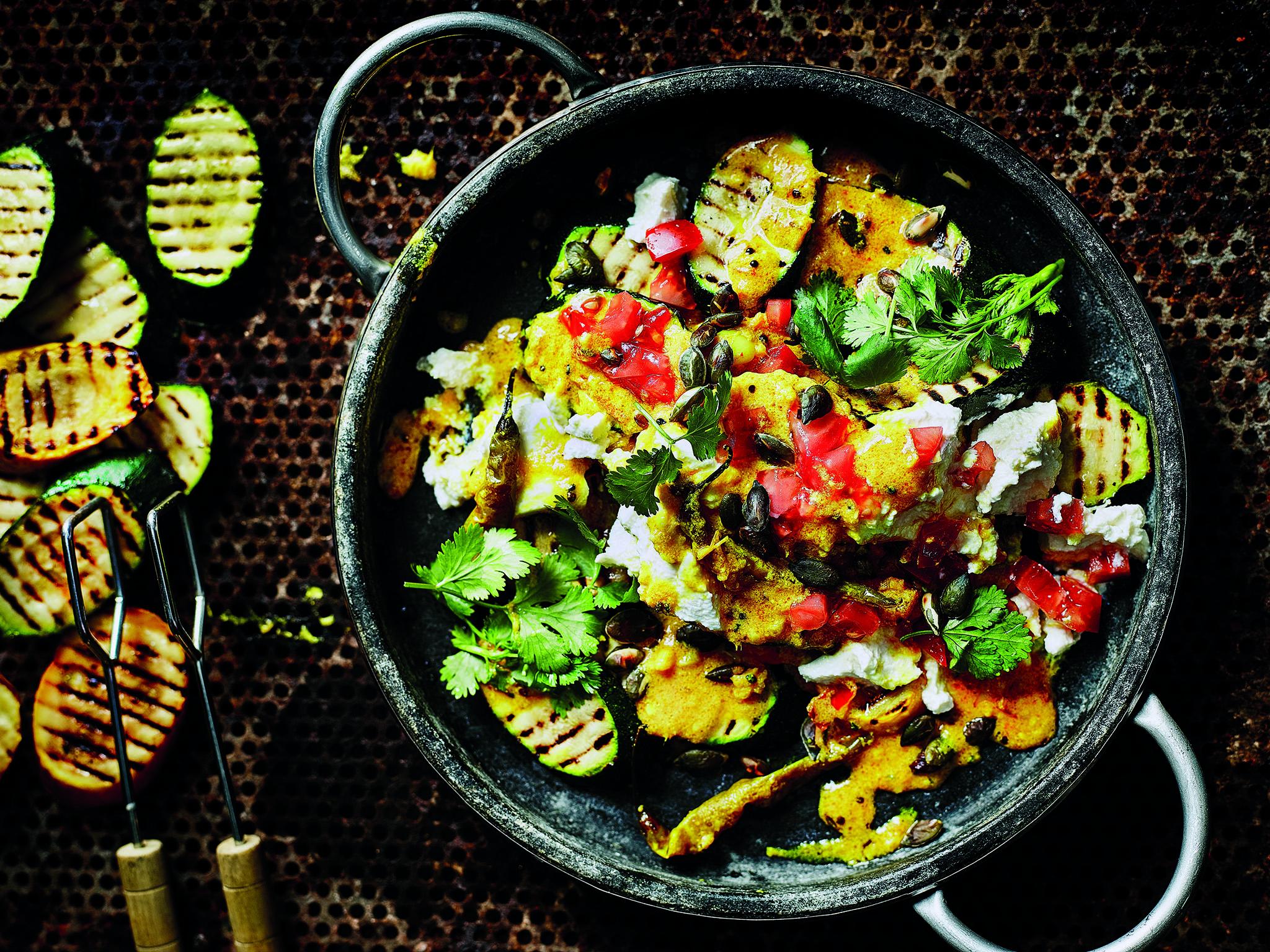Anjum Anand's alternative barbecue recipes: From tandoori sea bream to spiced sweetcorn
Grilling something on the barbie has come a long way since your uncle was burning sausages to an absolute crisp. Instead try these recipes, from spiced sweetcorn and Bengali sauces over courgettes and tandooried fish

Flame-grilled spiced sweetcorn
4 sweetcorn cobs
2 tbsp chaat masala
1⁄8–1⁄4 tsp chilli powder, or to taste
a little unsalted butter or low-fat crème fraîche (optional)
1 lemon, cut lengthways into 4–6 wedges
Peel back the husks of the sweetcorn, leaving them attached to the cobs. Remove the silky bits and wash the cobs well. Mix the chaat masala and chilli powder in a small bowl. Preheat the barbecue.
Grill the sweetcorn directly over a high heat, turning often with the leaves, until lightly charred all over (if it rains you can do this directly over a gas flame). When cooked, smear each cob with butter or crème fraîche, if you want.
Serve the sweetcorn with the lemon wedges and a little mound of the spice blend on the side. Dip the wedge in the spices and rub them over the sweetcorn, squeezing a little lemon juice on as you do and serve.

Barbecued tandoori-style sea bream
Tandoori fish is always a treat; the gentle tandoori flavour and the carom seeds here work so well with fish. I cook this on the barbecue in those hinged grills for whole fish. The result is smoky, tangy and lightly spicy. I use Kashmiri chilli powder as it has a mild heat but a vibrant colour, which somehow whets the appetite when you are eating tandoori-style dishes. These are deceptively easy to make once you are confident with a barbecue. You can also make this in the oven: I force a couple of skewers along the length of the body and place them on the edges of the baking tray so that the fish is cooked suspended, as in a proper tandoori oven. You can also make little fish tikkas with this recipe, using good firm fish pieces, under a hot grill. Serve with tangy herb chutney and a crunchy salad.
Serves 4
For the fish
2 whole sea bream, or snapper, cleaned, gutted, scaled and fins removed by the fishmonger
a few squeezes of lemon juice, plus lemon wedges, to serve, or lime wedges
salt
a little vegetable oil
1–2 tbsp unsalted butter, melted, to baste
a little paprika (optional)
a few good pinches of chaat masala
coriander, to serve
For the marinade
4 large garlic cloves
10g (2 tsp) roughly chopped root ginger (peeled weight)
3 tsp lemon juice
1–2 tsp Kashmiri chilli powder, or paprika for colour and chilli powder for heat
1 tsp ground cumin
2 tbsp vegetable oil
150g (1⁄2 cup) plain yogurt
1⁄4 tsp freshly ground black pepper
1⁄2 tsp carom seeds
1 rounded tbsp chickpea flour
Using a sharp knife, score each fish 4 times on each side through the skin, about 5mm (¼in) into the flesh. Squeeze over some lemon juice and sprinkle a little salt inside and out, then set aside for 10–15 minutes. Blend together all the ingredients for the marinade except the carom seeds and chickpea flour. I often add a little extra paprika for a good red colour. Taste and adjust the seasoning; at this stage it should taste a bit too salty and spicy, and that’s fine. Add the carom seeds and chickpea flour.
Smear the marinade thickly over both sides of each fish and into the slits. Leave to marinate for 45–60 minutes. Meanwhile, preheat the barbecue to a medium-high flame. I like to use a hinged fish rack in which I put the fish, but be careful that it doesn’t flatten it too much. (You can also use 2 metal skewers per fish.) Oil the grill rack and the fish rack.
Place the fish on the heat and cook for 6–8 minutes on the first side, or until the underside is a lovely golden colour with some areas of charring. If the coals are too hot, rake them away slightly. Turn the fish and cook the underside in the same way. If using skewers, the fish might stick a little, so be careful before turning. The fish is done when golden on both sides; to check if it is done on the inside, you can use a thermometer which should read 60°C when poked into the thickest part of the fish.
Baste both sides with the melted butter as it cooks and chars, adding paprika to the butter for a good colour, if you want. Sprinkle with chaat masala and serve with lemon or lime wedges and coriander.

Barbecued courgettes with Bengali sauce
The Bengalis have a delicious dish of little aubergine rounds nestling in a lightly creamy mustard and yogurt sauce. It is truly tasty and forms the inspiration for this barbecue dish. Here I make the sauce separately (and very quickly), adding some tomatoes to the basic recipe, and have swapped the aubergines for courgettes, which work so well with the mustard flavours. This is an amazing side dish for any barbecue, but also makes a lovely, light course for vegetarians, in which case I sometimes add ricotta and/ or two large handfuls of chickpeas for protein. A Bengali would use mustard seeds but, when you grind mustard seeds, they can sometimes turn bitter, so unless you are already familiar with this delicious but fickle spice, use the prepared mustard as I do here. It works just as well, you just lose a little extra body. The sauce is also delicious with some barbecued chicken and fish, so maybe make extra!
Serves 2–3
3 tsp prepared English mustard, or
2 tsp brown mustard seeds, or to taste
salt
10g (2 tsp) roughly chopped root ginger (peeled weight)
3 large garlic cloves, halved
3 1⁄2 tbsp extra virgin olive oil, plus more to brush the courgettes
1⁄2 tsp panch phoran
3–4 Indian green finger chillies, stalks removed, pierced with the tip of a knife
3 quite rounded tbsp thick Greek yogurt
1 large tomato, chopped
1⁄2 tsp ground turmeric
3 courgettes, sliced diagonally into 1.5cm thick rounds
150g ricotta
handful of chopped coriander
2 1⁄2 tbsp pumpkin seeds, lightly toasted in a pan until puffed up
If using mustard seeds, soak them in 60ml (4 tbsp) water for 15 minutes. Add a large pinch of salt, the ginger and garlic and blend until smooth. The mustard seeds do not need to break down completely. It will smell lovely and mustardy. If using prepared mustard, blend the ginger and garlic with some water and mix with the mustard and some salt.
Heat the oil in a small non-stick pan. Add the panch phoran and, as the seeds pop, reduce the heat, add the green chillies and fry for another 10 seconds.
Add the mustard seed paste (if using), cleaning the blender container with a little water and adding it to the pot. Cook for a few minutes or until the garlic smells cooked and has darkened ever so slightly. Add the yogurt, most of the tomato, salt and turmeric and stir continuously until it comes to the boil. Stir in the prepared mustard (if using) and a splash of water and return to the boil, it should have the consistency of light cream. Adjust the mustard and salt to taste: it should be punchy, the vegetable can take it. Set aside.

Preheat the barbecue to medium-hot. Brush the courgette slices with olive oil, place on the grill rack and cook, until charred on both sides, around 2 minutes each side. Meanwhile, place the mustard sauce in a flameproof pan on the barbecue as well, to reheat the sauce, or just reheat it on the hob.
Place the courgettes on your serving plate, top with the ricotta, then the sauce, reserved tomato, coriander and pumpkin seeds. Serve hot.
Anjum Anand is the found of Spice Tailor. Extract from I Love India by Anjum Anand. Published by Quadrille, £20. Photography: Martin Poole
Join our commenting forum
Join thought-provoking conversations, follow other Independent readers and see their replies
Comments
Bookmark popover
Removed from bookmarks